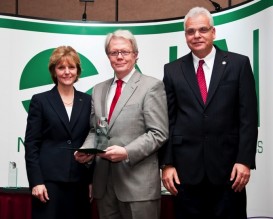Huntington Potter of Crnic Institute Named a Charter Fellow at National Academy of Inventors
 Huntington Potter, Ph.D., Director of Alzheimer’s Research at the Linda Crnic Institute for Down Syndrome and the University of Colorado School of Medicine’s Department of Neurology, was inducted into the National Academy of Inventors by being named a Charter Fellow.
Huntington Potter, Ph.D., Director of Alzheimer’s Research at the Linda Crnic Institute for Down Syndrome and the University of Colorado School of Medicine’s Department of Neurology, was inducted into the National Academy of Inventors by being named a Charter Fellow.
Potter’s groundbreaking research in the field of Alzheimer’s disease led to the discovery of the mechanistic relationship between Alzheimer’s and Down syndrome. During his esteemed career, he invented the first practical electroporation device for making transgenic organisms and has been awarded 15 U.S. patents, including several on diagnosing and treating Alzheimer’s disease.
Potter is among 101 innovators from 56 research universities and nonprofit institutes to be inaugural fellows and was inducted by the United States Commissioner of Patents, Margaret A. Focarino, at the 2nd Annual Conference of the National Academy of Inventors on Feb. 22 in Tampa, Fla. Inductees include eight Nobel Prize winners, and four recipients of the National Medal of Science, including Robert Gallo, who co-discovered the HIV virus, Solomon Snyder, who discovered the mechanism of addiction, and Nick Holonyak, who invented the first practical LED.
“Throughout his career, Huntington Potter has demonstrated the leadership and innovation the selection committee looked for in charter fellows,” said Paul Sanberg, president of the National Academy of Inventors and senior vice president for Research & Innovation at the University of South Florida. “His work has contributed materially to the understanding and treatment of Alzheimer’s disease — in particular, his discoveries regarding amyloid formation and Alzheimer’s connection to Down syndrome were breakthroughs in the field.”
Potter’s recent research includes the GM-CSF treatment for Alzheimer’s, which involves the drug Luekine. GM-CSF is a protein that is secreted by patients with rheumatoid arthritis that may help explain why those patients rarely develop Alzheimer’s disease. Mice with Alzheimer’s disease that have been injected with Leukine were cured, and the invention is being proposed as a treatment for Alzheimer’s in humans, with clinical trials underway in Tampa and soon to follow in Denver.
Read the full press release on the Global Down Syndrome Foundation’s press page.
Recent Posts
- Exclusive Interview with Edmonton Down Syndrome Society Executive Director Janet Tryhuba
- Global Down Syndrome Foundation & Down Syndrome Diagnosis Network Sign Multi-Year Collaboration Agreement
- Building the Future Gala Raises $212,000 to Support Down Syndrome Advocacy and Research
- Exclusive Interview with Down Syndrome Association of Jacksonville Executive Director Debbie Revels
- GLOBAL Raises $450,000 at their AcceptAbility Gala as Celebrities & Congress Step Out for People with Down Syndrome

 Experience our inspirational and groundbreaking videos and photos. Our children and self-advocates are beautiful AND brilliant!
Experience our inspirational and groundbreaking videos and photos. Our children and self-advocates are beautiful AND brilliant! Make sure your local Representatives are on the Congressional Down Syndrome Task Force.
Make sure your local Representatives are on the Congressional Down Syndrome Task Force.